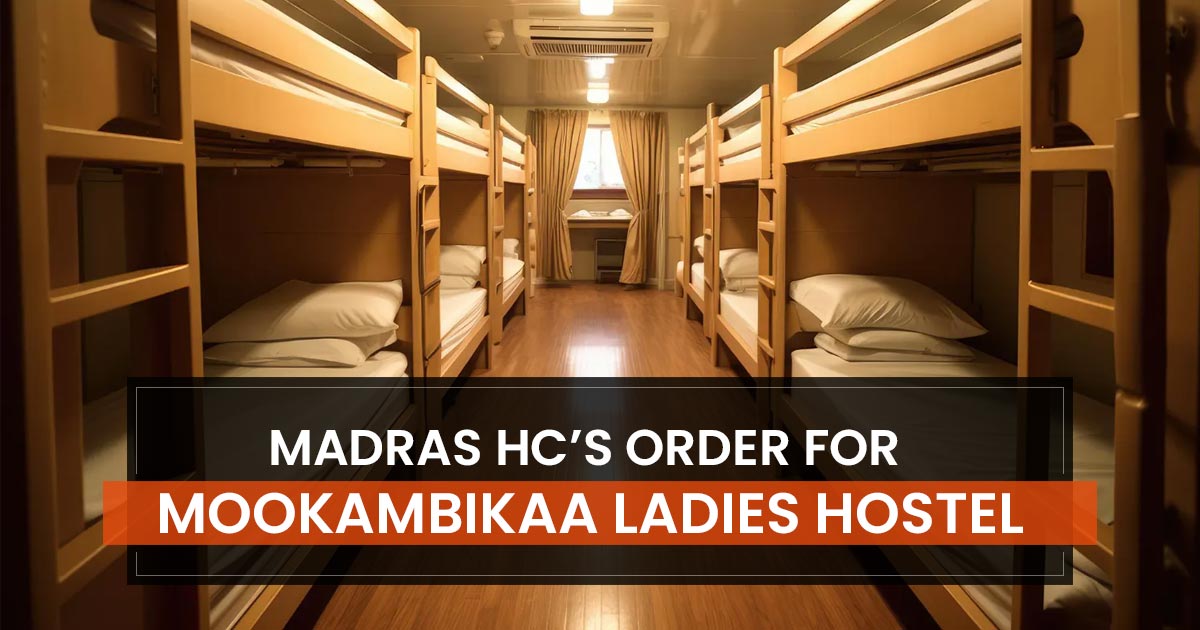
The Madras High Court, Goods and Services Tax will not be charged on hostels as it comes under the purview of ‘Residential Dwelling For Use as Residence’ under Entry Nos.12 and 14 of the GST notification No. 12/2017-Central Tax (Rate) on June 28, 2017.
The bench of Justice Krishnan Ramasamy said that renting out the hostel rooms to the female students and working women by the applicants is only for residential purposes, this Court thinks that the condition defined in the Notification to claim exemption, viz., ‘residential dwelling for use as a residence’ has been fulfilled by the applicant and therefore the said services are covered under Entry Nos.12 and 14 of the Notification No. 12/2017-Central Tax (Rate) on June 28, 2017, the applicants are qualified to be exempted from GST imposition.
All the writ petitions and Writ Miscellaneous Petitions (WMP) have been taken by the High Court, which secures identical facts, circumstances, and issues for issuing a common order.
The petitioners, along with the Thai Mookambikaa Ladies Hostel, hold licenses to run private ladies’ hostels, furnishing accommodation and meals to college students and working women every month at a lower cost. Their procedures have philanthropic motives, aiming to offer a safe environment for female students and workers from distant areas who stumble to discover affordable accommodation in the city, they said.
The Central Government following the GST regime enactment, issued exemption notifications specifying particular categories of exempt services.
The applicant claimed that their provision of residential accommodation to female students and working women qualifies for GST exemption under these notifications. Ms Aparna Nandakumar, representing the applicants, contended that the hostels run by them qualify as ‘residential dwellings’ under Entry 12 of Exemption Notification No.12/2017, dated 28.06.2017, exempting them from GST.
GST statutes do not furnish a particular definition for ‘residential dwelling,’ she directed to the Taxation of Services an Education Guide issued by the CBIC, which described the same as “any residential accommodation” excluding places indicated for temporary stay. Established on this understanding, she claims that the petitioners’ ladies’ hostels, furnishing the accommodation to female students and working women, are permitted to the exemption and, thus not accountable for Goods and Services Taxes (GST).
She claimed that as per Section 2(e) of the Tamil Nadu Hostels and Home for Women and Children (Regulation) Act, 2014, a ‘hostel’ or ‘lodging house’ is described as a building furnishing the accommodation for women or children, with or without boarding. Section 2(14) of the Tamil Nadu Shops & Establishments Act, 1947 depicts a ‘residential hotel’ as premises conducting business for delivering dwelling accommodation.
She claims that hostel accommodation controlled under the Hostel Regulation Act varies from hotel accommodation.
The court stressed that the load lies on the applicants to prove their hostels qualify for the exemption. It remarked that “in the said notification for renting of properties by the hotel, motel, inn, guest house, campsite, lodge, house boat, or like places meant for temporary stay has not been exempted”
The Second Respondent, Tamil Nadu Authority for Advance Ruling (TN AAR) corresponded that the hostel premises were on par with hotel premises and that the applicant’s purpose in renting out the premises in the name of hostels, is nothing but to provide hotel accommodation and it does not qualify as a residential dwelling for use as a residence. However, the Madras High Court set aside the AAR ruling.
It is outlined by the High Court that the GST on the hostel accommodation must be acknowledged from the motive of the service of the receiver, not the provider. The TN AAR wrongly deemed the GST charge as a load on the service provider while it was collected via the receiver and deposited with the government by the provider.
As per the bench, the GST levy on the hostel accommodation hinges on whether the occupants use the premises for residential or commercial purposes. On the residential nature of the end use GST exemption is contingent, instead of the property’s nature of the business of the service provider. Therefore, the court outlines the viewing of the issue of GST from the perspective of the receiver, rather than the service provider.
Hence, the Madras High Court ruled in favour of the applicants by waiving off the Hostels from GST. Therefore, allowed all writ petitions and set aside the impugned orders without levying any costs.
| Case Title | Thai Mookambikaa Ladies Hostel Vs. Union of India |
| Appeal Number | W.P.No.28486 of 2023 |
| Date | 22.03.2024 |
| For Petitioner | Ms.Aparna Nandakumar |
| For Respondents | Mr.A.P.Srinivas, Mr.Rajanish Pathiyil |
| Madras High Court | Read Order |